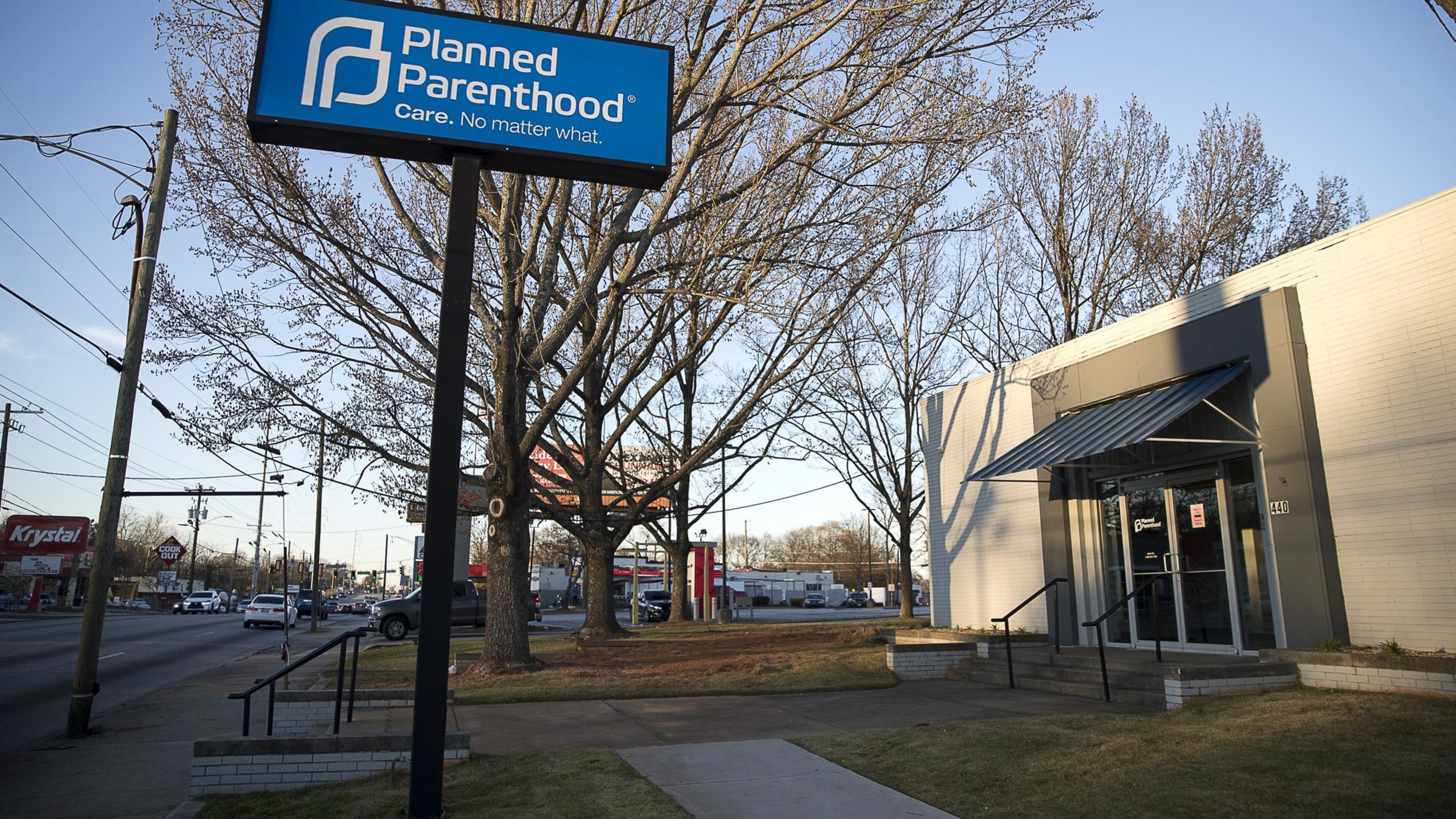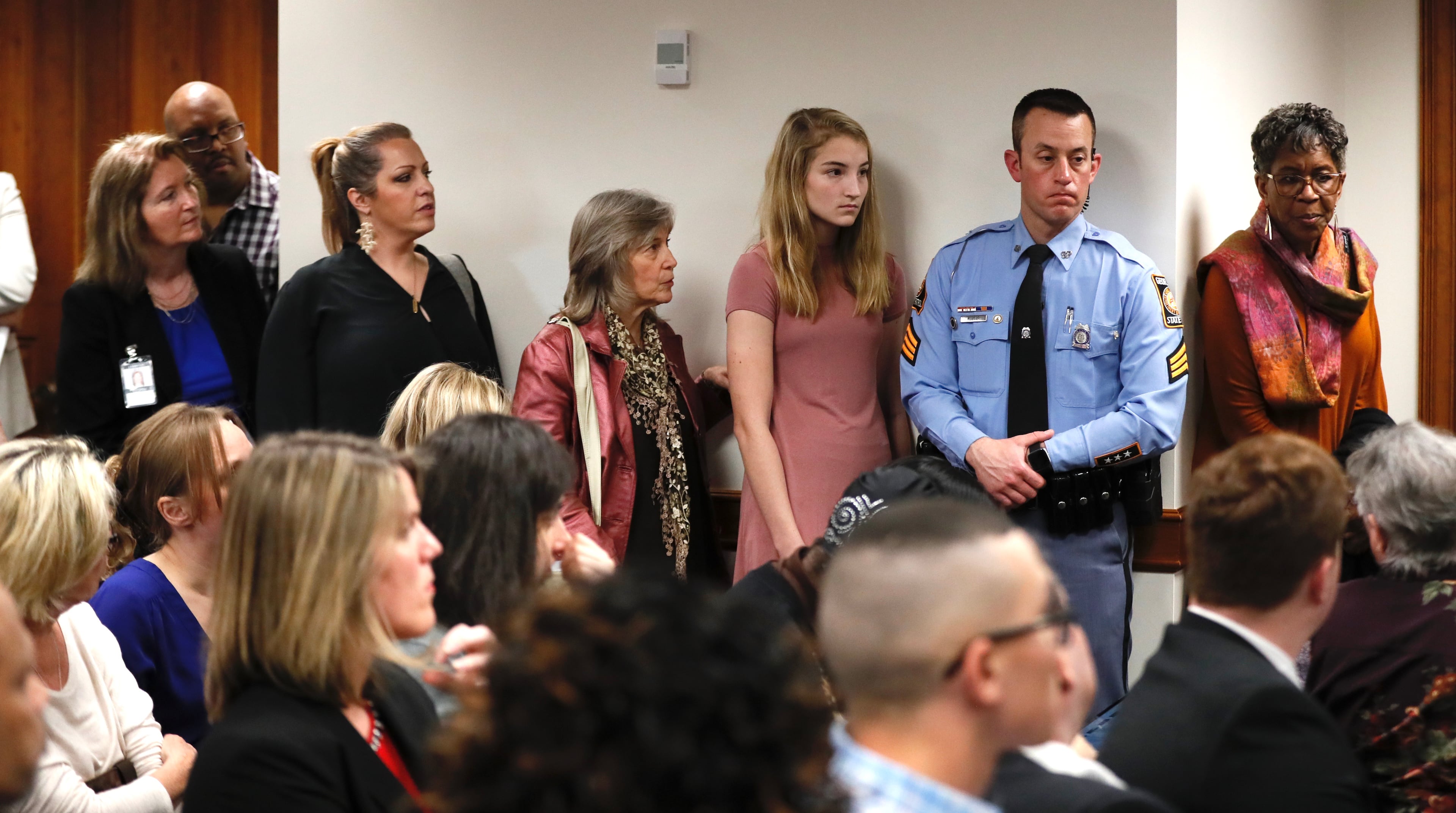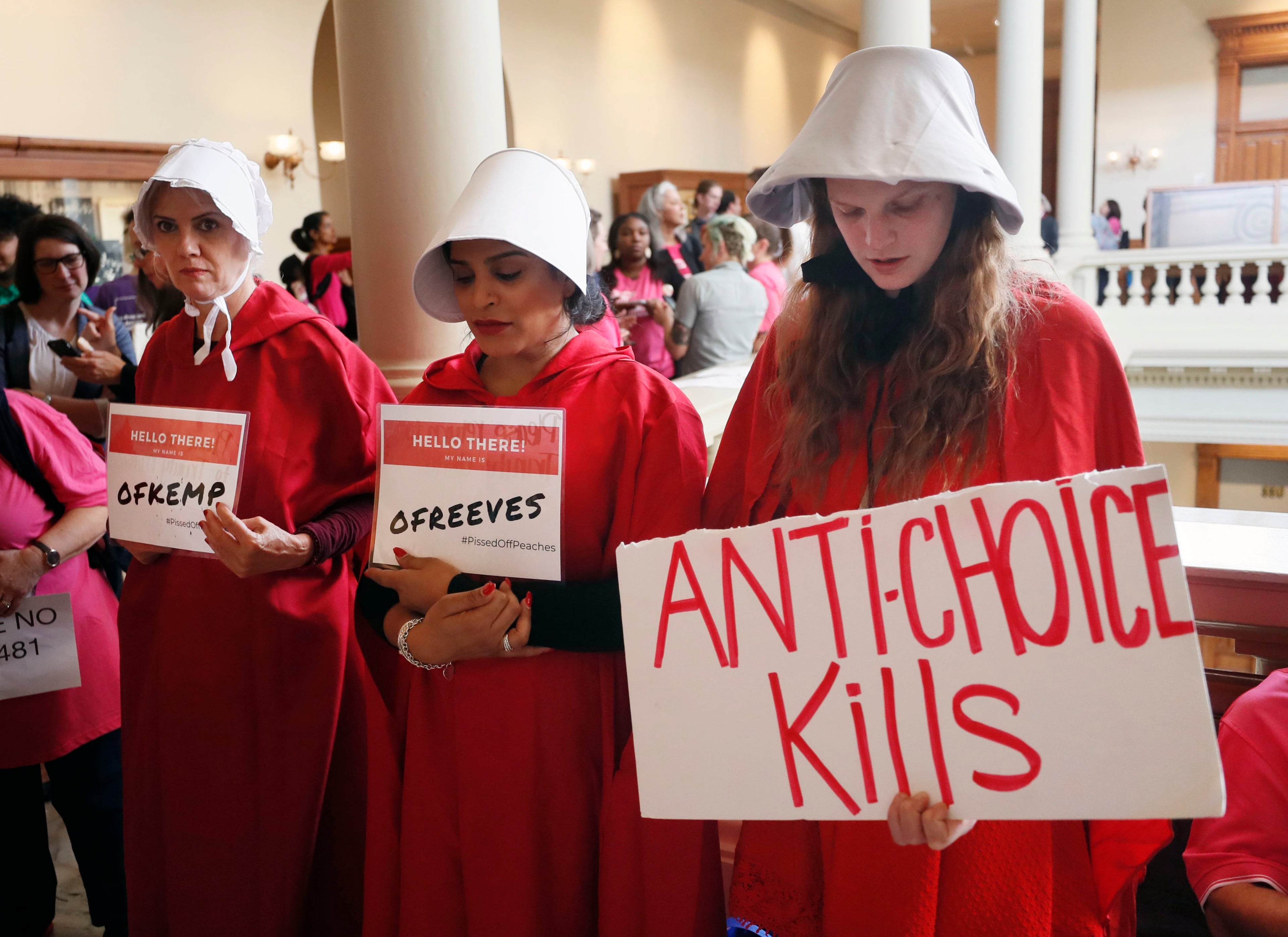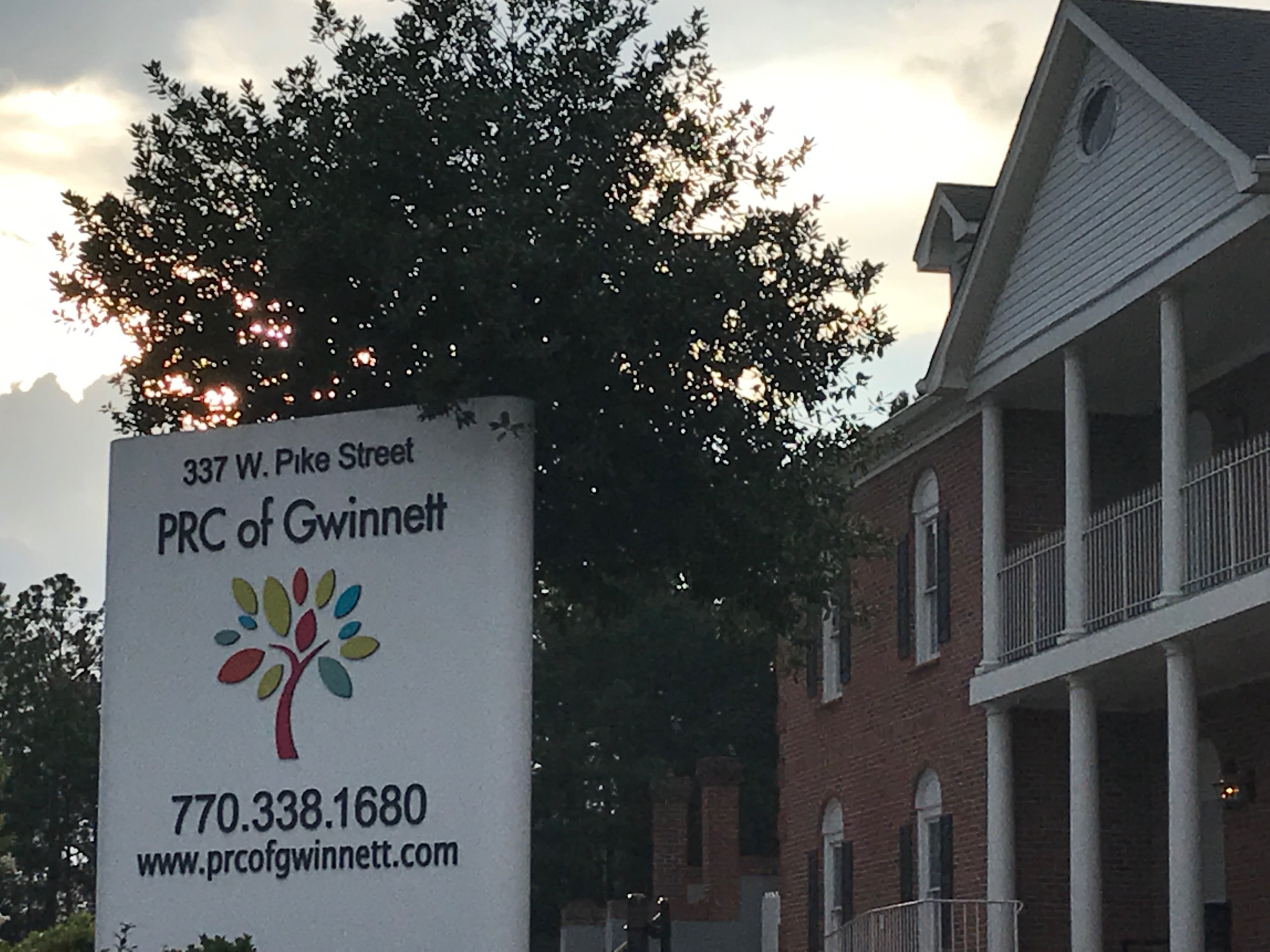Georgia ‘heartbeat bill’ spurs strong debate about abortion

Liz Reed was 15 when she got pregnant in 2005.
At the urging of her family, Reed scheduled an abortion. But a trip to a North Georgia crisis pregnancy center — and hearing the heartbeat of the 7-week-old embryo in her womb — changed her mind. She knew she had to bring her baby into the world even if she didn’t have the means to support it.
That September, she gave birth to a baby girl who then went to a couple that had tried for years to have children.
Things were different for Jen, who asked that her last name be withheld. Jen, 43, said she knew as soon as she missed her first menstrual cycle last fall that she was pregnant. She would have to raise a baby alone, and that wasn’t something she was financially able to do.
She scheduled an appointment in November at the Planned Parenthood near her home in metro Atlanta and, when she was about eight weeks pregnant, took two pills that ended her pregnancy.
Under a proposal working its way through the Legislature, neither Jen nor Reed, who is now 29, would have had the option to have an abortion.
Georgia lawmakers are considering a bill that would ban most abortions as soon as a doctor can detect a heartbeat in the womb, which is usually about six weeks into a pregnancy. The measure, House Bill 481, has sparked a fierce and emotional debate over the point life begins and the role of government in health care.

The legislation comes at a time when several states are tackling the issue of abortion, from similar measures that would limit access in states such as Kentucky and Tennessee to bills guaranteeing access in Illinois and New York.
Many of the bills that have sought to limit access have run into legal trouble. Every "heartbeat bill" that has passed across the country so far has been overturned in a state or federal court, while in other states the bills were never signed into law.
And the Trump administration is being sued over its proposed changes to Title X funding that would bar taxpayer-funded family planning clinics from referring women to abortion providers.
The moves have mobilized forces on both sides of the issue.
Some Georgians have seen the availability of abortion whittled down in recent years, and with the makeup of the U.S. Supreme Court leaning more toward conservative ideals, they fear that even more restrictive laws could be upheld.
Others see an opportunity to end what they believe is a great moral wrong.
Hearings on HB 481 have attracted overflow crowds of passionate advocates from both sides. Some told deeply personal stories about their own decisions. Others debated the science.
So fraught has been the debate, that lawmakers had the committee room checked for bombs before Thursday’s Senate committee hearing.
>> Hearing on Georgia ‘heartbeat’ abortion bill draws emotional crowd
>> Photos: Georgia lawmakers debate ‘heartbeat’ abortion bill
>> Your copy of the Georgia Senate’s ‘heartbeat’ anti-abortion bill
>> In Georgia, abortion vote is a possible political turning point
Since Roe v. Wade
In 1973, the U.S. Supreme Court ruled in its landmark Roe v. Wade decision that a woman had a right to an abortion up until the fetus had a viable chance at life outside the womb.
Since then, states have struggled to legislate when that viability — and life — begins.
The ruling established “viability” at the beginning of the third trimester, which is sometime between the 24th and 28th week of pregnancy, and Georgia followed the federal guidelines. Once in the third trimester, the court ruled that abortions could only be provided if the mother’s life or health was at risk.
In 2005 — the same year Republicans took complete control of state government — Georgia passed a law that requires abortion providers to tell pregnant women a range of information including any medical risks associated with abortion and carrying to term, as well as the gestational age of the fetus.
Women must also wait 24 hours before getting an abortion.
Georgia passed a law in 2012 banning abortions after 20 weeks that, after temporarily being blocked in court, went into effect in October 2015. The previous limit was 26 weeks. While the 20-week limit is in place, the case is still making its way through the legal system.
Abortions later than 20 weeks are only allowed when a fetus has congenital or chromosomal defects.
Two years later, the Legislature passed a law requiring parents to be informed at least 24 hours before their minor child receives an abortion, unless the girl petitions the court to waive the notification rule.
The Georgia Department of Public Health is tasked with overseeing the state’s abortions. Doctors who perform abortions after 20 weeks without an exemption are at risk of having their license suspended and facing one to 10 years in prison.
While there are no known cases of doctors being prosecuted for violating the law, doctors say it has had a chilling effect. A lawyer for the Georgia Composite Medical Board, which is tasked with tracking violations, said she could not say whether any have been reported.
Overturning Roe
Planned Parenthood Southeast President and CEO Staci Fox called the heartbeat bill a de facto ban on abortion, saying that most women are not even aware that they’re pregnant until about eight weeks.
“Banning abortion is just the latest fight over women’s autonomy,” she said. “It was (access to) birth control before that. It was the right to vote before that. It was owning property before that. We, as a society, still haven’t resolved the fact that women are humans.”

There are currently about 20 lawsuits surrounding abortion — including several heartbeat laws — up for consideration by the U.S. Supreme Court that could challenge the Roe v. Wade decision.
Georgia anti-abortion activists hope the state’s heartbeat bill will be the one that overturns the court’s ruling.
The bill's sponsor, state Rep. Ed Setzler, said he has wanted to push legislation that puts additional limits on access to abortion since he was elected 14 years ago. If a heartbeat is what determines the end of life, he said it should also be considered when life begins.
“It’s so important we act on this,” the Acworth Republican said. “We have to protect children that have heartbeats. We know they’re part of the human community.”
Getting an abortion in Georgia
The state Department of Public Health reported more than 27,000 abortions were performed in 2017, the most recent year available.
The number of abortions has fluctuated in recent years but has generally trended down from about 32,000 in 2008.
In 2017, more than 129,000 babies were born in Georgia. That number also has decreased since 2008, when there were about 146,000 children born.
Georgia law requires that an abortion be performed by a licensed physician, meaning an obstetrician/gynecologist or family doctor who’s been trained can carry out the procedure.
There are at least nine abortion facilities in Georgia, with most in the Atlanta area. That lines up with where health care is available in the state — half of Georgia counties have no ob/gyn.
Abortions can be done surgically up to 20 weeks or “chemically” for women who are between five and 10 weeks pregnant by taking medication. At Planned Parenthood, women who are more than 10 weeks pregnant are referred to doctors who can perform an abortion.
![03/06/2019 -- Atlanta, Georgia -- Jennifer [last name withheld], a volunteer at the Planned Parenthood East Atlanta health center, talks about her experience with using the service provided by the center, Wednesday, March 6, 2019. (ALYSSA POINTER/ALYSSA.POINTER@AJC.COM)](https://images.ajc.com/resizer/v2/ZLWJNO2LDOVPQLJEMHZKWLTEGQ.jpg?auth=4be8751f0e1a0c3d39ff84486e39c78f2475bd2946cd39f3fbb38f4cb6e48925&width=3840&height=2560&smart=true)
The “morning after pill” does not cause an abortion, but instead prevents a woman who’s had unprotected sex from becoming pregnant. It must be taken within five days. It’s unclear how often the emergency contraception is used.
In some cases, private insurance will cover abortion. Public insurance plans, for the most part, don’t. It is explicitly prohibited in Georgia’s state employees insurance program, as well as Medicaid — the government health care program for the poor and disabled — and plans on the Affordable Care Act exchanges, except in cases of rape, incest or the life of the mother is at risk.
Jen paid about $500 for her abortion. Her insurance did not cover it.
She went to Planned Parenthood for her abortion because she knew she would not be judged. She has volunteered with the organization for years.
“It’s a very traumatizing experience no matter what,” she said. “If you add all the shame and the stigma, it’s really isolating. But I have no regrets. I know it was the right thing for me. I never wanted to raise a child alone after seeing what my mother went through with me.”
Jen was raised by a single mother who had her when she was 17 years old.
Jen recalls that a day or so before her appointment, she received a call from Planned Parenthood to go through the state-mandated counseling that described what the process would be like and let her know there were other options.
On the day of her appointment, Jen said she signed and initialed several forms, indicating multiple times that she was sure she wanted an abortion. She was then left by herself in a room to watch an informational video in which actors simulated what it was like to have an abortion and reminded her that there were other options available.
Jen then met with a doctor, who performed an ultrasound to determine how far along she was in her pregnancy and make sure there was only one embryo. She was asked whether she wanted to see the embryo or hear the heartbeat, but she said she declined.
Then she took a pill and was instructed to take a second pill between 24 and 48 hours later at home.
“It was really terrible,” she said. “It’s like having a miscarriage.”
Crisis pregnancy centers
In Georgia, the number of abortion clinics is far exceeded by organizations called “crisis pregnancy centers” that urge women to give birth. They offer assistance, including education about alternatives to abortion, to ease the burden of an unplanned pregnancy.

For more than a decade, Daphne Harris Nicely has worked with such facilities.
Nicely served as executive director and CEO of the Atlanta Pregnancy Resource Center a faith-based practice with a mission of encouraging pregnant woman to give birth. The Atlanta Pregnancy Resource Center is now known as the Human Coalition Women's Care Clinic.
There are 91 crisis pregnancy centers in Georgia, according to a University of Georgia-run website.
It was at one of those crisis centers that Reed at 15 decided against having an abortion.
“They asked if I was interested in having an ultrasound and I said yes,” said Reed, who lives in Sugar Hill. “As soon as they turned it on and found the heartbeat and I heard it, it hit me: That’s a heartbeat that is a separate person from me.”
She said she decided right then she was going to have her baby — and her mother put her out. Knowing she couldn’t raise a baby at 15 on her own, she found a family through an adoption agency to raise her daughter.
“I think about her every day,” she said.
Reed said she thinks having the ability to choose between abortion and adoption helped her to heal.
“I don’t think I would be as at peace with my decision as I am now,” she said. “I’m obviously very pro-life, but I don’t know that I support telling people what they can and can’t do. I think the way abortion is going to end is through education and love.”
Still, she said, if the heartbeat bill means there are fewer abortions in Georgia, she supports it.
Nicely is now the executive director of the Atlanta Morning Center, which provides free care from prenatal to postpartum to women who are uninsured or underinsured. She said her organization is "life affirming." It also aims to improve women's health.
The fact that Georgia has among the highest rates of maternal mortality was a big talking point of the 2018 election season, but Nicely said she hasn’t heard about anything being done to address the issue since then.
She said while she and her organization are “pro-life,” she wished the energy around the heartbeat bill was being spent on addressing maternal mortality.
‘Science has caught up’
Much of the debate over the bill has focused on the question of what a hearbeat signifies.
Setzler says science has allowed doctors to determine when a fetus has a heartbeat, “catching up” to the way abortion has been regulated. Previously, he said, doctors said during the early stages of pregnancy that an embryo is only a mass of tissue.
“This bill is medically sound, legally sound and, from the perspective of commonsense Georgians, is something we can coalesce around and support,” Setzler said.

But Dr. Melissa Kottke, an Atlanta-based ob/gyn who has practiced for 10 years, said Setzler’s bill is “built on a foundation of misleading statements and scientific inaccuracies.”
Doctors who oppose the legislation testified that what the bill’s supporters call a “heartbeat” detected at six weeks actually signals the practice motions of developing tissues that could not on their own power a fetus without the mother.
“It is extremely dangerous for lawmakers to presume they are better equipped than a woman and her health care provider to judge what is appropriate medical care,” she said. “This compromises both the integrity of the patient-physician relationship and the medical practice of evidence-based standards.”
Abortion rights activists have vowed to fight the proposal throughout the legislative process and, if it becomes law, in court.
After hours of emotional debate leading to the measure narrowly passing the House earlier this month, a Senate panel on Thursday heard several more hours of public testimony on HB 481.
The committee is expected to vote on the measure Monday.
The legislation has the support of Gov. Brian Kemp, who vowed during his campaign last year to sign the toughest abortion laws in the country.
To make it to Kemp’s desk this year, it must be approved by both chambers by the time lawmakers adjourn April 2.
Preparing for a fight
Those on both sides of the issue are preparing for a fight when the bill hits the Senate floor.
Anti-abortion lawmakers have called on their colleagues to vote with their conscience and acknowledge that if life begins at conception, terminating a pregnancy is immoral.
"As we look through things in the state of Georgia, let's dig deep in our convictions and be less political," said state Sen. Bruce Thompson, R-White. Thompson introduced similar legislation in the Senate, but it went nowhere.
Democrats and abortion rights activists say it’s unwise to vote against women in an era when female voters are showing up at the polls in droves.
"If you want to slam through this anti-abortion bill, just be prepared for the consequences," Democratic state Sen. Nan Orrock of Atlanta warned her colleagues last week.
Fox, the Planned Parenthood Southeast CEO, said abortion rights activists already plan to target lawmakers who voted for the legislation. A Democrat announced his intent to run against Setzler the day after it cleared the House.
“We’re taking it one step at a time,” Fox said. “I’m focused on the fight of HB 481. But I’m already planning for next year and taking notes on who votes against women. We’re coming for those seats next year.”
Balanced coverage
Abortion is a divisive issue.We take great care with these types of stories and have tried to represent multiple points of view in our ongoing legislative coverage.



